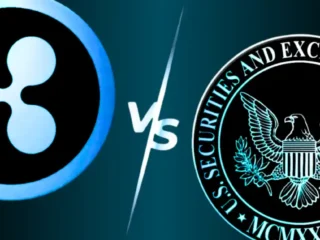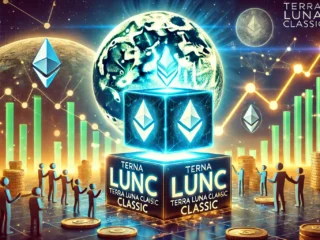
- Vechain pursues vaccine supplies in real time using IoT and Smart Contracts to ensure security and compliance.
- Preferred counterfeits in drugs are fought by recording counterfeit -proof data in every phase of the pharmaceutical supply chain.
Vechain has expanded its real benefits by covering pharmaceutical supply chains. A new scientific work published by Carter Happer on Researchgate illuminates Vechain’s partnership with DNV and the government of Shanghai.
The paper focuses on the use of blockchain to pursue vaccines via the endpoints production, sales and retail. The initiative deals with counterfeits and regulatory gaps in the pharmaceutical supply chain and is a model for scalable, counterfeiting logistics.
More Transparency of the supply chain and compliance with regulations
The paper “Blockchain integration for transparent and safe pharmaceutical supply chains“ revealed The ongoing weaknesses in pharmaceuticalogistics. Data transparency, counterfeiting risks and fragmented traceability are particularly problematic for health crises. According to the study, blockchain technology offers an unchangeable recording system, data integrity and transparency.
VeChain makes pharma headlines.
A new academic paper highlights $VET’s live role in vaccine tracking:
“VeChain partnered with DNV & Shanghai to launch a blockchain-enabled vaccine system — bringing transparency, compliance, and trust back to public health.”
From wine… pic.twitter.com/Nl5uNOzVee
— Sebastian.vet Ⓥ
(@PERE_Mainz) June 30, 2025
The project from VECHAIN used with DNV and the government of Shanghai Smart-Contracts and IoT sensors to monitor vaccines in real time. The system records each step from production to delivery on the Vecharthor blockchain.
According to Carter Happer, IoT integration enables continuous monitoring of storage conditions such as temperature and moisture. The geolocalization ensures continuous transparency, and RFID labels can recognize manipulations and mark anomalies.
The study compares the implementation From Vechain with other initiatives such as Mediledger and the IBM DHL cooperation. Mediledger focuses on compliance with legal regulations in the USA and uses Zero Knowledge Proofs for data protection, while the implementation of Vechain concerns the safety of vaccines in China after there were previously concerns about public health.
According to the study, real-time data protocol simplifies the blockchain audits and supports immediate product recalls as well as compliance with framework works such as the US Drug Supply Chain Security Act (DSCSA).
Vechain supports interoperability and security
The paper describes the technical architecture of the Blockchain from Vechain. The platform uses Proof of Authority (POA) as a consensus mechanism that is suitable for approved networks with pre -verified participants. Validation nodes are regulatory authorities, participant nodes are manufacturers, distributors and pharmacies.
Smart-Contracts are the heart of the system. They automate the review of compliance with regulations, environmental monitoring and the review of payments. For example, logistics service providers are only paid if the environmental and delivery conditions meet the predefined standards. The data flow is designed in such a way that each transaction step is recorded cryptographically.
Integration with existing company systems is also covered. The VECHAIN framework supports connections with ERP, SCM and LIMS systems. Middleware and APIs enable hybrid. According to the study, interoperability is the key to acceptance by those involved and the introduction on a large scale.
Intelligent contracts automate official controls, compliance with temperature controls and payment trigger. RFID labels and IoT devices monitor geolocalization and environmental data and create a secure test path.
Supervisory authorities have controlled access to complete transaction protocols, while pharmacies and logistics providers can only view relevant data. The use of zero knowledge-proofs ensures the Compliance with the GDPR and Hipaa regulations And guarantees both data protection and traceability.
Effects on the industry and challenges in the introduction
The paper emphasizes the current problems in pharmaceutical logistics, in particular the threat of fake medication. According to the World Health Organization, 10 % of medical products in countries with low and medium -sized incomes are inferior or fake.
Blockchain helps here by assigning a clear digital identifier to each medicine unit. These can be verified via QR codes or blockchain interfaces so that the authenticity can be checked in real time in every phase of the supply chain.
In addition to security, the blockchain also improves operational efficiency. Automated work processes reduce manual paperwork and accelerate processes such as compliance reports, recall management and inventory tracking. The paper refers to industry estimates that Blockchain could reduce the costs of the pharmaceutical supply chain by up to 30 %.
But the introduction has their pitfalls. The author Carter Happer mentions the limited scalability of current blockchain networks, the lack of standardized data formats for all involved and unresolved legal questions in connection with decentralized data storage and case law.
The future developments include Integration of Blockchain with AI for predictive analyzes, the takeover of global data standards by the GS1 and WHO frame as well as the implementation of cryptographic post-quantum protocols for long-term data security.
How CNF reportedis the VECHAIN project for vaccine tracking an example of how these technologies can be used in the real world. The platform combines blockchain with IoT sensors and official supervision to ensure transparent and counterfeiting drug logistics.
Every phase of the supply chain-from production to delivery-is recorded in the Vecharthor blockchain. This enables the immediate detection of anomalies such as temperature deviations or manipulation events.










No Comments